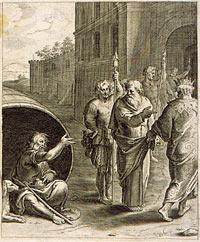|
Diogenes - "The
Cynic"
(BC, c412-323)
Illustration: Mary Evans
Picture Library
 Diogenes was chief among the school known as the
cynics, though possibly not representative of it [Diogenes
"carried the principles of the sect to an extreme of asceticism." (OED.)].
It was said of Diogenes that throughout his life he "searched with a lantern in
the daylight for an honest man." And though Diogenes apparently did not find an
honest man, he had, in the process, "exposed the vanity and selfishness of man."
(Chambers.) Diogenes was chief among the school known as the
cynics, though possibly not representative of it [Diogenes
"carried the principles of the sect to an extreme of asceticism." (OED.)].
It was said of Diogenes that throughout his life he "searched with a lantern in
the daylight for an honest man." And though Diogenes apparently did not find an
honest man, he had, in the process, "exposed the vanity and selfishness of man."
(Chambers.)
The sect, known as the cynics, was founded by Antisthenes
(444-370 BC), a pupil of Socrates; it was "marked by an ostentatious contempt
for ease, wealth, and the enjoyments of life." Diogenes was a pupil of
Antisthenes. Diogenes, on coming to Athens from his native lands, Sinope, came
as "a rake and spendthrift." After following under the spell of Antisthenes,
Diogenes "became at once an austere ascetic, his clothing of the coarsest, his
food the plainest, and his bed the bare ground. At length he found himself a
permanent residence in a tub."
(The meaning of cynicism today is to be found in the
OED. "A person disposed to rail or find fault; now usually: One who shows
a disposition to disbelieve in the sincerity or goodness of human motives and
actions, and is wont to express this by sneers and sarcasms; a sneering
fault-finder." The image of a cynic that has come to us is that of a dog.)
An interesting story is the one where the young
Alexander the Great (356-323 BC) met Diogenes, then a very
old man. The powerful young conqueror, being solicitous of the old philosopher,
asked what, if anything he could do for him. Diogenes replied, "Stand out of my
sunshine"; to which he added, as Alexander took his leave, "If I were not
Alexander, I would be Diogenes."
by
Blupete (Peter Landry)
Find out more about Diogenes at the
Internet Encyclopedia of Philosophy or at
essay on philosophy by
Ben Best.
|



 Diogenes was chief among the school known as the
cynics, though possibly not representative of it [Diogenes
"carried the principles of the sect to an extreme of asceticism." (
Diogenes was chief among the school known as the
cynics, though possibly not representative of it [Diogenes
"carried the principles of the sect to an extreme of asceticism." (